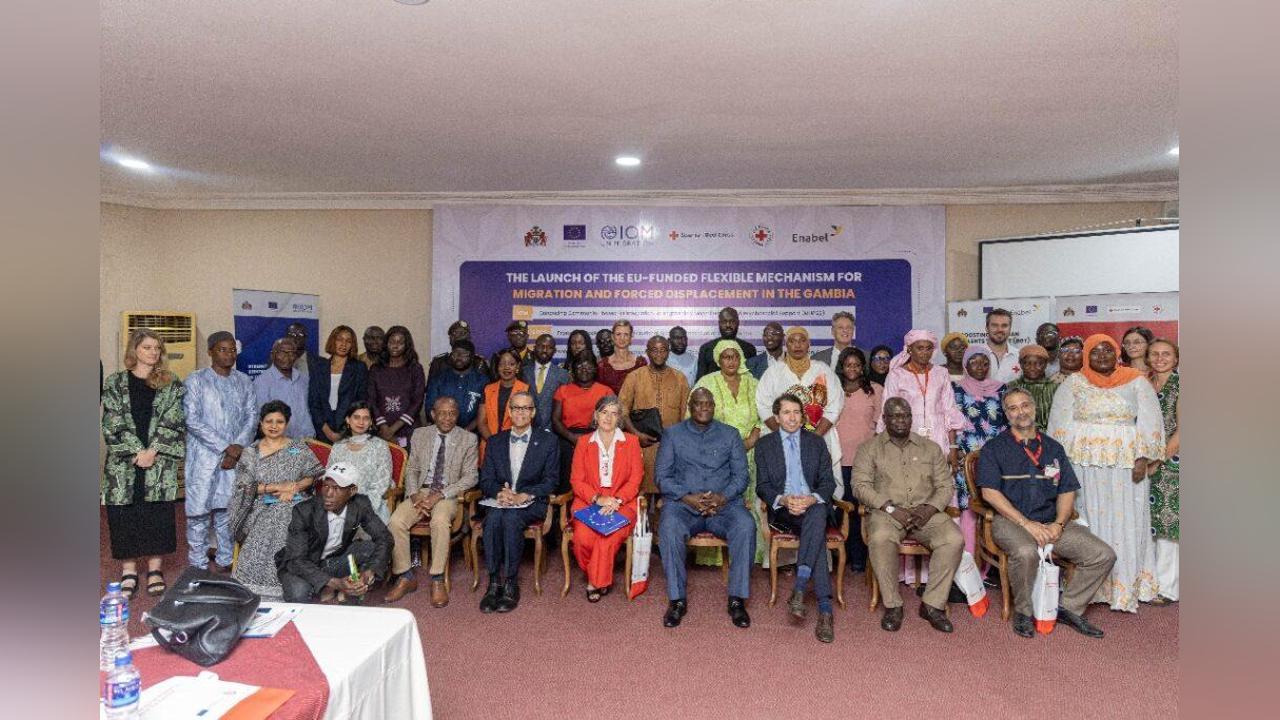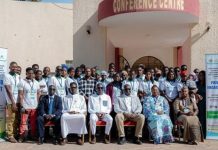Africa-Press – Gambia. The European Union jointly with The International Organization for Migration (IOM), the Belgian Agency for International Cooperation (Enabel),The Gambian Red Cross Society (GRCS) and Spanish Red Cross (SpRC))launched a new project to strengthen social support for migrants,provide sustainable reintegration support to returnees and boost Gambian talent.
Funded by the European Union under the Flexible Mechanism for Migration and Forced Displacement, the three actions, amount to a total of one billion seven million five hundred eighty-three thousand eight hundred fifteen dalasi (EUR 12 million). The actions will enhance sustainable reintegration and assistance to migrants; supporting local entrepreneurs, foster private sector partnerships and diaspora engagement; and promoting safe, regular and concerted mobility for talented Gambians.
“We remain determined to strengthen governance structures, enhance data systems, and ensure that migration contributes to national development, social cohesion, and the well-being of all Gambians,” said Honorable Sering Modou Njie, Minister of Foreign Affairs, International Cooperation and Gambians Abroad (MoFA). “The project actions we are launching today speak directly to this vision. They are equally aligned with the government’s broader objective of transforming migration into a catalyst for development ensuring that human mobility becomes a pathway to empowerment rather than vulnerability.”
The three projects will contribute to the Government of The Gambia’s overall efforts to strengthen migration governance, enhance job creation and entrepreneurship opportunities, while using short-term entrepreneurial mobility schemes to create private sector partnerships that add value and attract diaspora investments for local businesses.
The complementarity and the strategic focus of the actions of the projects of the three institutions are also critical to addressing the immediate and long-term needs of returnees and migrants as well as the advancement socioeconomic development in communities across the country.
The EU Ambassador to The Gambia, Imma Roca i Cortés stated: “Migration is not a problem to be solved, but a reality to be managed — responsibly, humanely, and sustainably,”. She added: “The projects are a clear demonstration that the European Union and The Gambia share a deep commitment to managing migration in all its dimensions in a way that protects human dignity and creates hope for the future.”
The initiative comes at a crucial time as a significant number of Gambians who have left the country and are stranded on the migration routes to North Africa and Europe, with no means to continue their journeys. With little hope of reaching their intended destinations, many of them decide to return home but lack resources to do so. Similarly, youth unemployment and underemployment remain among the most pressing challenges in The Gambia, leaving many young people with limited opportunities to build sustainable livelihoods. This lack of prospects often fuels irregular migration, fondly known as the back way, with The Gambia ranking among the top five countries of origin of migrants arriving irregularly in Europe in 2024, according to IOM’s data.
The programme is relevant to and aligned with not just the overall visions of the three implementing institutions, but also The Gambia’s strategic development priorities as well as several milestones including the establishment of a National Coordination Mechanism on Migration, the National Migration Policy and the National Employment Policy 2022-20226 reflecting the Government commitment to managing migration from a whole-of-government perspective as well as expanding entrepreneurship ecosystem and creating job opportunities. The Projects are closely aligned with The Gambia’s priorities on harnessing the positive potential of migration for socio-economic development and addressing drivers of irregular migration as highlighted in the Recovery-Focused National Development Plan (RF-NDP) 2023–2027.
For More News And Analysis About Gambia Follow Africa-Press






